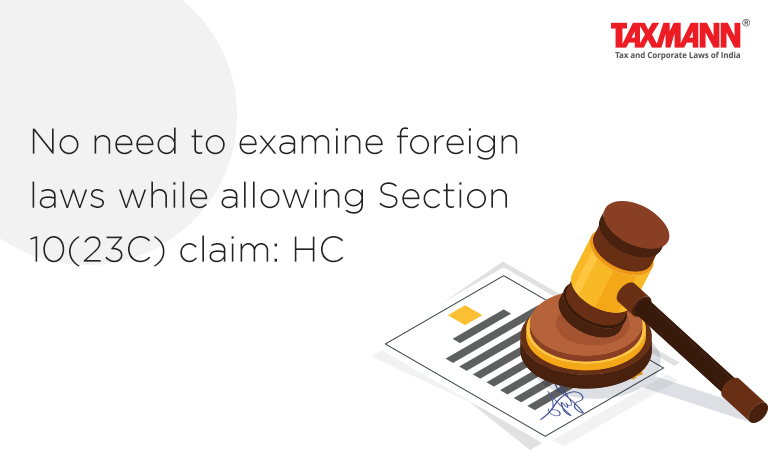No need to examine foreign laws while allowing Section 10(23C) claim: HC
- Blog|News|Income Tax|
- 2 Min Read
- By Taxmann
- |
- Last Updated on 17 March, 2023

Case Details: Laura Entwistle v. Union of India - [2023] 148 taxmann.com 251 (Bombay)
Judiciary and Counsel Details
-
- Dhiraj Singh Thakur & Kamal Khata, JJ.
- P.F. Kaka, Sr. Adv. Divesh Chawla, Jas Sanghavi & Revati S. Nansi for the Petitioner.
- Suresh Kumar for the Respondent.
Facts of the Case
Petitioner was a trustee of the American School of Bombay Education Trust (ASB) which was set up after the embassy of the United States of America along with specific permissions granted by the Ministry of External Affairs. During the relevant assessment year, the ASB was supported by the South Asia International and Educational Services Foundation (SAIESF), a non-profit organisation based in United States of America.
SAIESF incurred various expenses in support of ASB, i.e., school material and freight, salaries of teachers and administrators, education grants, etc. The surplus arising from time to time was repatriated in India, and the petitioner invested the same in accordance with Section 11(5).
Petitioner’s application under section 10(23C) was denied by the Commissioner of Income-tax (CIT) on the grounds that the petitioner was unable to produce any evidence retaining to the correctness of its accounts of SAISEF and the books of accounts of SAISEF had not been audited by the Revenue.
Aggrieved by the order, the petitioner filed writ petition before the Bombay High Court.
Revenue submitted before the High Court that exemption under Section 10(23C)(vi) applies to institutions where it is possible to examine the accounts properly to ensure that the income is properly applied for educational purposes and the funds are invested in the prescribed manner.
In the given case, it was impossible to conduct verification since it involved examining the law and practice of another country. Consequently, it was not possible to check what amounts were received outside India and how they were spent. Thus, CIT had rightly denied the exemption to the petitioner.
High Court Held
The High Court held that the Income-tax Act concerned the income coming to India and being Repatriated out of India. Income earned and expenditure incurred outside India by any person or entity do not concern the Income-tax Department in as much as the Income-tax Act is not attracted.
In the instant case, SAIESF was repatriating money into India and not repatriating from India. Thus, incomes earned and expenditure incurred outside India by such Foundation is not a matter of concern for the Income Tax Department in India.
The CIT can be concerned only with the application of income in the hands of ASB/the petitioners once received in India. This is because in the present case, ASB/the Petitioners were not transferring/repatriating any money outside India to any person or entity.
CIT have no concern about the receipts and expenses made by an entity outside the country merely because it transfers its surplus or even a portion thereof to an entity in India. Therefore, the exemption under section 10(23C)(vi) cannot be denied once it is confirmed that the petitioner exists to provide education and not for profit.
Disclaimer: The content/information published on the website is only for general information of the user and shall not be construed as legal advice. While the Taxmann has exercised reasonable efforts to ensure the veracity of information/content published, Taxmann shall be under no liability in any manner whatsoever for incorrect information, if any.

Taxmann Publications has a dedicated in-house Research & Editorial Team. This team consists of a team of Chartered Accountants, Company Secretaries, and Lawyers. This team works under the guidance and supervision of editor-in-chief Mr Rakesh Bhargava.
The Research and Editorial Team is responsible for developing reliable and accurate content for the readers. The team follows the six-sigma approach to achieve the benchmark of zero error in its publications and research platforms. The team ensures that the following publication guidelines are thoroughly followed while developing the content:
- The statutory material is obtained only from the authorized and reliable sources
- All the latest developments in the judicial and legislative fields are covered
- Prepare the analytical write-ups on current, controversial, and important issues to help the readers to understand the concept and its implications
- Every content published by Taxmann is complete, accurate and lucid
- All evidence-based statements are supported with proper reference to Section, Circular No., Notification No. or citations
- The golden rules of grammar, style and consistency are thoroughly followed
- Font and size that’s easy to read and remain consistent across all imprint and digital publications are applied



 CA | CS | CMA
CA | CS | CMA
